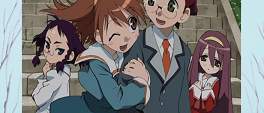
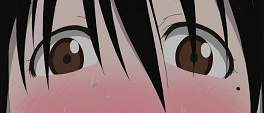
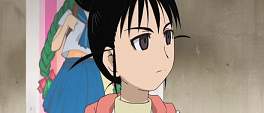
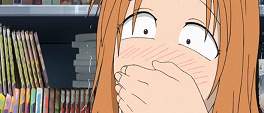
Lifting off directly after the first season of Genshiken, the OVAs unfortunately have to the play the middle-child by introducing two new characters and settling them into the storyline in evident preparation for the second season. Handed over to the Kujibiki Unbalance studio Ajia-do, the OVAs suffer from sometimes atrocious animation but thankfully keep the charm and humour that made the first season so good.
Note: The aspect ratio for the screengrabs is incorrect, this is due to a combination of the way I capture screengrabs and the source I took them from; I have corrected this in the thumbnails and a pixel aspect ratio aware program (such as Adobe Photoshop) will display the screengrabs in their canonical ratio of 16:9.
the voyeuristic novelty of peering into an oft experienced group dynamic
The core characters remain unchanged however the focus has shifted away from the ambiable Sasahara and the entire three episode run is dedicated almost entirely to Kasukabe, Madarame and Ogiue. This is not as detrimental as it sounds and by concentrating on these characters the OVAs serve as a peninsula to the main series' continent, never feeling overwhelmed by the wealth of personalities available and not retreading old ground. It would be absurd to the view the OVAs as anything more than an extension of the first series and the soap opera appeal remains as does the down-to-earth comedy.
Read the rest of this entry
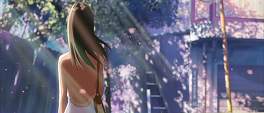


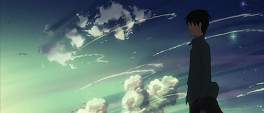
Words seem almost inadequate when trying to convey the wistful nostalgia evoked by 5 centimeters per second. Every scene in the petite one hour movie is visually arresting, the sparse dialogue secondary to the unspoken emotion loaded into each moment; it is beautiful, moving and amazingly personal film. Separated into three chronologically sequential stories, the film follows Takaki Tohno and his relationship with childhood friend Akari Shinohara.
each sky, each train car, each snow swept vista is beauteous and beyond the capabilities of real life to produce
The first story, Oukashou, comprises Takaki's fraught train journey to see Akari after they were separated due to parental employment. Occupying the bulk of the movie's timeline, the subtext of distance and solitude will be instantly familiar to anyone who has seen Makoto Shinkai's previous works: Voice of a Distant Start (Hoshi no Koe) and The Place Promised in our Early Days (Kumo no Mukou, Yakusoku no Basho). Even in such a short time-frame, Takaki's journey is sentimental and emotive, cutting straight to his fears and expectations unconcerned with exterior bravado. Scene by scene, poise and grace is established by valuing silence as much as dialogue and the ever present melody of the piano. The first story culminates in a serene landscape of snow and darkness before Takaki heads home in the fresh morning sunlight, starting the narrative cycle once more with the second and then third stories.
Read the rest of this entry
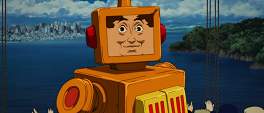
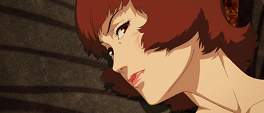

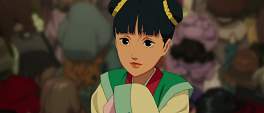
It's not a stretch to say that Paprika is the movie that Satoshi Kon has been building up to. Simply attaching his name to a film indicates its content: a trip into the human psyche where perspectives blend and questions about the nature of "self" are posed. This is no different and follows a similar formula to his other films where alternate realities begin to intrude on actual reality, eventually blurring the already indistinct line between the two. Intellectualism and introspection aside, while not a different blueprint to previous movies such as Perfect Blue or Millennium Actress, Paprika is far better paced and perhaps a lot more subtle than previous works, helped no doubt by the blindingly excellent animation from auteur favourite, Madhouse studios.
opening with a rampant and glittering circus performance, and ending with a chaotic and destructive parade
The questions Paprika asks are not new to anyone who has had a cursory glance at the philosophy and literature surrounding recent Hollywood fare, most notably The Matrix and Eternal Sunshine of a Spotless Mind among others; how it asks them is unique though. The film focuses on a device which allows a psychotherapy professional to both view and interact with a person's dreams, potentially identifying the root cause of their psychological problem and "fixing" it; this sets up a tight cast of characters ranging from an obese genius to a duplicitous therapist to a troubled police officer, all of whom take part in a technicolour journey that eventually culminates in a potentially world-altering event. The aforementioned therapist has the titular alter ego whose flippancy is only matched by her choice of attire and it is through her eyes and dives into dreamscapes that the story unfolds.
Read the rest of this entry

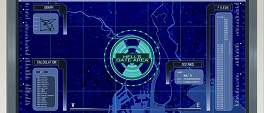
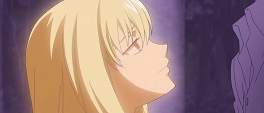
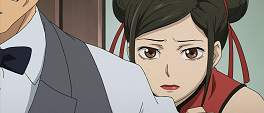
Darker than Black is fundamentally Hei's story
I mentioned in
my review of Darker than Black that it's a series which is as complicated and metaphorical as you wish it to be really and given the ending which seemed to finish the series without completing it, there's plenty of tid-bits to sift through and question. It was made clear that another episode of the series, number twenty six, would be released on DVD, however word is that this is a side-story rather than the much anticipated explanation so many desire.
Read the rest of this entry
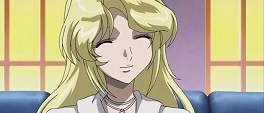
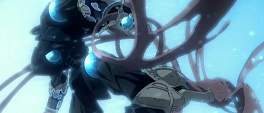
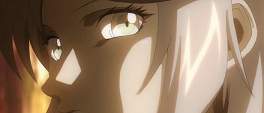
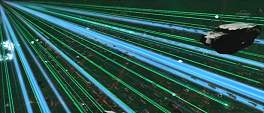
There is only one way to describe the scope and scale of Heroic Age: operatic. Far from the derogatory connotations of "Space Opera" championed by other anime such as Sekai no Senki (Banner of the Stars), it is a grand yet personal series which is ceaselessly ambitious, frequently breathtaking and always graceful and poised in its delivery. It is as diverged from the trappings of pulpy space opera as can be by excelling at both the intimate moments and the monumental battles.
favouring silence over exposition and meandering thoughts versus concrete conclusions
From Angela's typically vast opening through the orchestral stirrings comprising the bulk of the soundtrack to the tender melody of Ishikawa Yui's closing, even the audio of the series is grandiose, evocative and fitting as battles are fought, lives lost and emotions plucked. The most prominent part of Heroic Age is the epic battles fought across light-years and planets, yet even this is but a small part of the series as it never allows itself to be nailed down to one narrative device, switching seamlessly from a light hearted fish-out-of-water story to the machinations of the deity-like antagonists. The surprisingly large cast of characters are expertly fleshed out and range from fatally stupid to dashingly honourable; Deianeira, the protagonist and a royal princess, is pitched as the prototypical naive leader, however her astute decision making rightly inspires the most indomitable loyalty and by the climax her role as a strong, impassioned woman is unquestionable.
Read the rest of this entry



















